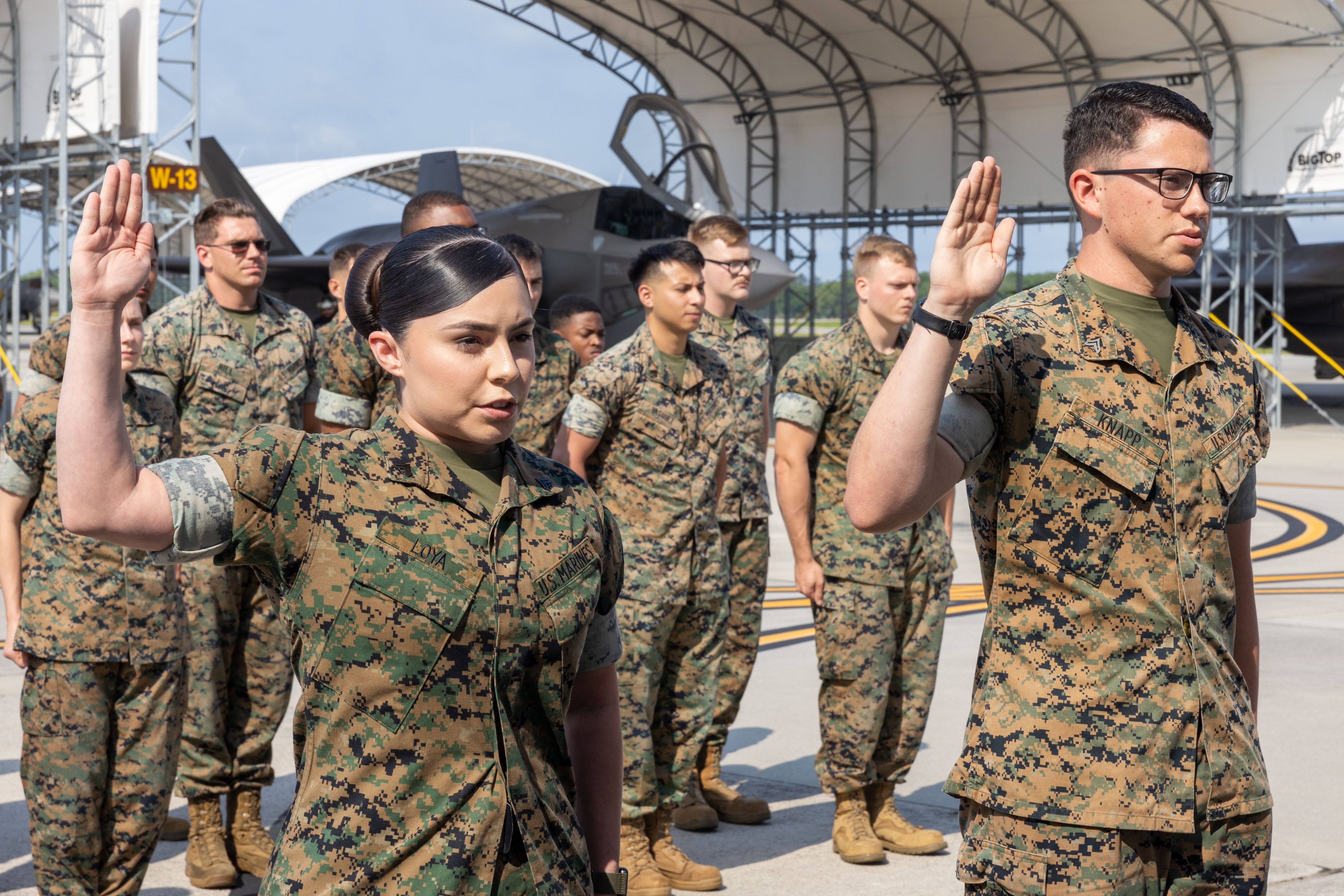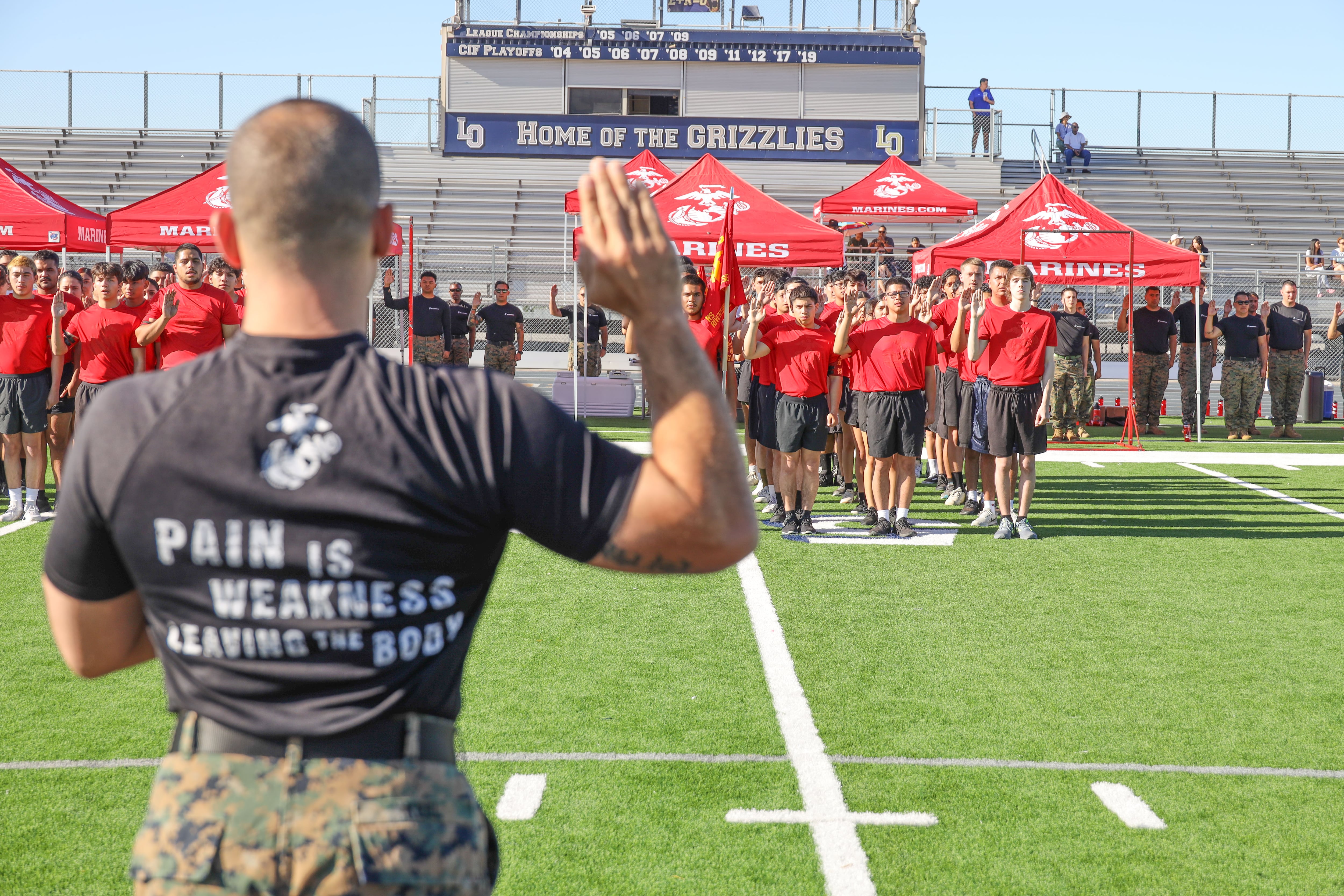The Marine Corps inched past their recruiting goal for enlisted Marines this fiscal year, but nonetheless got beyond their goals for new officers and enlisted, continuing a trend of making their recruitment numbers as the other services struggled in recent years.
The Marines aimed to bring in 30,500 new enlisted Marines this fiscal year, which ends Monday.
They notched one additional Marine above their target number, and brought in 28 officers more than their target of 1,778, according to data provided by Marine Corps Recruiting Command.
The Marine Corps and Space Force were the only military branches to meet their recruiting goals last fiscal year, and the Corps has not missed its accession mission since 1994, officials said.
RELATED

Col. Michael Hays, assistant chief of staff for operations at recruiting command, said he was “very proud” of Marine recruiters for achieving their mission. But he had a word of caution.
“It was a challenging year, but once again our Marine Recruiters and Officer Selection Officers stayed in the fight and made mission,” Hays said. “We know [Fiscal 2025] will be a similar fight, but our Marines are focused and determined to do what Marines always do – accomplish the mission.”
Those top-line numbers are for brand-new enlisted and officer Marines. The Corps also met its prior service Reserve accessions goal of a mix of 3,979 officers and enlisted who had previously served in one of the military branches and joined the Marines in fiscal 2024.
Due to historic success at retaining first-term Marines this fiscal year, the Corps was also able to schedule 600 enlistees to ship to recruit training in fiscal 2025. That figure puts the service at 27% of their enlisted recruiting mission for the next fiscal year before it begins. The fiscal 2025 enlisted accessions mission is 32,835.
And that 27% is the highest it’s been since COVID-19 disrupted recruiting for all services in 2020.
Last year, the number of recruits on contract awaiting ship dates at the beginning of fiscal 2024 was only 22% of their recruiting mission, according to data provided by the Marines.
That is an upwards trend, officials said, but it remains lower than typical pre-pandemic numbers.
Before the pandemic, the Marines averaged 53% of their “start pool,” or number of recruits already contracted and awaiting training ship dates, Marine Corps Recruiting Command spokesman Jim Edwards told Marine Corps Times.
“Rebuilding a quality start pool takes time, but [fiscal 2025] marks the first time since the COVID-19 pandemic the start pool has shown growth compared to the previous [fiscal year].” Edwards said.

Those “start pool” recruits remain in the Delayed Entry Program pool, which lasts anywhere from a few days to a year.
Longer times in the pool can help recruits better prepare physically and mentally for the rigors of recruit training, which can spell higher graduation success rates. However, any hiccups between contracting for enlistment and shipping, such as legal trouble or physical injuries, can put a dent in those committed numbers.
The Corps continues its pledge to recruit high-quality members. Along those lines, recruiters tripled the number of prior-service enlistees from 121 last year to 335 in fiscal 2024, Edwards said.
Among the fiscal 2024 enlistees, the Marines tallied 98% as high school graduates, Marine officials said, besting the Pentagon standard of 90%.
More than two-thirds of Marine enlistees scored in the top three tiers of the Armed Forces Qualification Test, again eclipsing the 60% standard set by the Pentagon.
An estimated 35% of all commissioned officer accessions included individuals from traditionally underrepresented categories, including female and racially or ethnically diverse candidates, officials said.
More than 12% of all officer accessions were women. Ten percent of all enlisted accessions were women.
The Marines have historically had the youngest members as its decades-long practice of “recruit and replace” saw about one-third of first-term Marine enlistees staying in the service, and only 45% staying beyond the second term.
Nearly two-thirds of subsequent-term Marines, meaning any Marine on their second or subsequent term of service, decided to stay in uniform for fiscal 2024, the highest since fiscal 2017, Marine Manpower and Reserve Affairs officials said.
But in recent years, Marine leaders are seeking to keep more Marines past their first enlistment, creating a more experienced, seasoned Marine leader in the junior and mid-career ranks.
The new model has been dubbed “recruit and retain.” And some recent developments suggest the strategy is working.
The service exceeded its first-term enlisted retention rate for fiscal 2024, keeping 117% of its target goal.
The Corps had a goal of keeping 6,950 of its first-term Marines eligible to reenlist. The service kept 7,947, according to service data.
That was the highest number of first-term Marines who stayed in the force since fiscal 2010, Marine officials said.
Part of that success was credited to a multi-year enlistment strategy in which career planners are going to Marines earlier in their contract to reenlist early, instead of waiting until their final year or months on their initial contract, officials said.
In other recruiting new, the Army announced Wednesday that it met its annual recruiting goal for the first time in two years, while the Air Force announced this summer that it was on track to hits it goals.
Meanwhile, Navy leaders said in August that the sea service would meet its goal to sign up 40,600 recruits by the end of September thanks to several new recruiting programs, but the crush of last-minute enlistments meant it won’t be able to get them all through boot camp by that time.
Todd South has written about crime, courts, government and the military for multiple publications since 2004 and was named a 2014 Pulitzer finalist for a co-written project on witness intimidation. Todd is a Marine veteran of the Iraq War.




